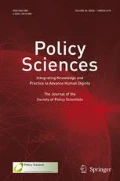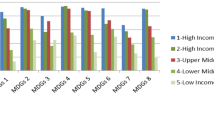Abstract
Claims to the inadequacy of GDP growth as an indicator of well-being improvement are widespread. Yet the notion of well-being is very broad, hence difficult to quantify, so alternative indexes (e.g., ISEW, GPI) may also be deficient. This article approaches well-being from a multi-dimensional perspective which, unlike earlier attempts to incorporate inequality and environmental variables, focuses especially on “ecological inequality,” or inequality in the distribution of the social cost associated with resource depletion. A methodology for assessing well-being improvements is developed, one which includes an accounting for ecological inequality, and is applied to four countries: Brazil, Costa Rica, Indonesia, and the Philippines. The variability in the results strongly suggests that in addition to depending on the subjective perspective of the policymaker regarding the relative importance of the income growth realized by different population groups, well-being assessments depend critically on the existing ecological distribution. More research into quantifying ecological distribution is therefore warranted. Absent significant progress in this area, sensitivity analysis such as that conducted here may inform policy better than GDP or alternative well-being indexes or aggregates.
Similar content being viewed by others
References
Ahluwalia, M. and H. Chenery (1974). ‘The economic framework,’ in H. Chenery, M. Ahluwalia, C. L. G. Bell, J. H. Dully, and R. Jolly, eds., Redistribution with Growth, London: Oxford University Press, pp. 38–51.
Asheim, G. (2002). ‘Green national accounting for welfare and sustainability: A taxonomy of assumptions and results’, Center for Economic Studies, Working Paper Series No. 827.
Barrera, A. (1997). ‘Degrees of unmet needs in the Superfluous Income Criterion,’ Review of Social Economy 55: 460–486.
Bartelmus, P. (1997). ‘Whither economics? From optimality to sustainability?,’ Environment and Development Economics 2: 323–345.
Bartelmus, P. and E. Seifert (2003). Green Accounting, The International Library of Environmental Economics and Policy Series, Aldershot: Ashgate Press.
Boyce, J. K. (1994). ‘Inequality as a cause of environmental degradation,’ Ecological Economics 11: 169–178.
Bullard, R. (2000). Dumping in Dixie: Race, Class, and Environmental Quality, 3rd ed., Boulder: Westview Press.
Bryant, R. L. (1992). ‘Political ecology: An emerging research agenda in third-world studies’, Political Geography 11: 12–36.
Castañeda, B. (1997). ‘An index of sustainable economic welfare (ISEW) for Chile,’ Institute of Ecological Economics, Solomons, MD, pp. 34.
Cobb, C., T. Halstead and J. Rowe (1995). ‘If GDP is up, why is America down?,’ Atlantic Monthly 276: 59–78.
Common, M. and C. Perrings (1992). ‘Towards an ecological economics of sustainability,’ Ecological Economics 6: 7–34.
Costanza, R., R. d'Arge, R. de Groot, S. Farber, M. Grasso, B. Hannon, K. Limburg, S. Naeem, R. V. O'Neill, H. Paruelo, R. G. Raskin, P. Sutton and M. van den Belt (1997). ‘The value of the world's ecosystem services and natural capital’, Nature 15: 253–260.
Cruz, W. and R. Repetto (1992). The Environmental Effects of Stabilization and Structural Adjustment Programs: The Philippines Case, Washington, DC: World Resources Institute.
Daly, H. (1991). Steady-State Economics, 2nd ed., Washington D.C. and Covelo: Island Press.
Daly, H. and J. Cobb (1989). For the Common Good: Redirecting the Economy towards Community, the Environment, and a Sustainable Future, Boston: Beacon Press.
Dasgupta, P. (1995). ‘Economic development and the environment: Issues, policies, and the political economy’, in M.G. Quibria, ed., Critical Issues in Asian Development, Oxford: Oxford University Press, pp. 160–185.
Dasgupta, P. and K. Mäler (2000). ‘Net national product, wealth, and social well-being’, Environment and Development Economics 5: 69–93.
Davidson, P. and D. Anderton (2000). ‘Demographics of dumping II: A national environmental equity survey and the distribution of hazardous materials handlers’, Demography 37: 461–466.
Ekins, P. (2000). Economic Growth and Environmental Sustainability: The Prospects for Green Growth, New York: Routledge.
Harberger, A. C. (1984). ‘Basic needs versus distribution weights in social cost-benefit analysis’, Economic Development and Cultural Change 32: 455–474.
Harrison, A. (1989). ‘Introducing natural capital into the SNA’, in Y. J. Ahmad, S. El Serafy and E. Lutz, eds., Environmental Accounting for Sustainable Development, Washington, DC: World Bank, pp. 19–25.
Khan, H. A. (1997). ‘Ecology, inequality, and poverty: The case of Bangladesh’, Asian Development Review 15: 164–179.
Lawn, P. (2003). ‘A theoretical foundation to support the index of sustainable economic welfare (ISEW), Genuine progress indicator (GPI), and other related indexes,’ Ecological Economics 44: 105–118.
Leipert, C. (1987). ‘A critical appraisal of gross national product: The measurement of net national welfare and environmental accounting’, Journal of Economic Issues 21: 357–373.
Lélé, S. (1991). ‘Sustainable development: A critical review’, World Development 19: 607–621.
Levett, R. (1998). ‘Sustainability indicators – integrating quality of life and environmental protection,’ Journal of the Royal Statistical Society 161: 291–302.
Lutz, E., ed. (1993). Towards Improved Accounting for the Environment, Washington, DC: World Bank.
Martinez-Alier, J. (1993). ‘Distributional obstacles to international environmental policy: The failures at rio and prospects after rio,’ Environmental Values 2: 97–124.
Martinez-Alier, J. (1995). ‘Distributional issues in ecological economics,’ Review of Social Economy 53: 511–528.
Martinez-Alier, J. (1997). ‘Some issues in agrarian and ecological economics, in memory of georgescu-roegen,’ Ecological Economics 22: 225–238.
Max-Neef, M. (1995). ‘Economic growth and quality of life: A threshold hypothesis,’ Ecological Economics 15: 115–118.
Millikan, B. H. (1992). ‘Tropical deforestation, land degradation, and society: Lessons from Rondônia, Brazil,’ Latin American Perspectives 19: 45–72.
Moore, D. S. (1993). ‘Contesting Terrain in Zimbabwe's Eastern Highlands: Political Ecology, Ethnography, and Peasant Resource Struggles,’ Economic Geography 69: 380–401.
Morris, D. (1980). Measuring the Condition of the World's Poor: The Physical Quality of Life Index, New York: Pergamon Press for the Overseas Development Council.
Neumayer, E. (2000). ‘On the Methodology of ISEW, GPI, and Related Measures: Some Constructive Comments and Some Doubt on the Threshold Hypothesis,’ Ecological Economics 34: 347–361.
Nordhaus, W. and J. Tobin (1972). ‘Is Growth Obsolete?’ in M. Moss (ed.), The Measurement of Economic and Social Performance, Studies in Income and Wealth, Vol. 38, National Bureau of Economic Research.
Pearce, D., K. Hamilton, and G. Atkinson (1996). ‘Measuring Sustainable Development: Progress on Indicators,’ Environment and Development Economics 1: 85–101.
Peet, R. and M. Watts (1993). ‘Introduction: Development Theory and Environment in an Age of Market Triumphalism,’ Economic Geography 69: 227–253.
Peluso, N. L. (1992). ‘The Political Ecology of Extraction and Extractive Reserves in East Kalimantan, Indonesia,’ Development and Change 23: 49–74.
Perrings, C. (1995). ‘Ecology, economics, and ecological economics,’ Ambio 24: 60–64.
Prescott-Allen, R. (2001). The Well-Being of Nations, Washington DC: Island Press.
Pezzoli, K. (1997). ‘Sustainable development: A transdisciplinary overview of the literature,’ Journal of Environmental Planning and Management 40: 549–74.
Repetto, R., W. Magrath, M. Wells, C. Beer and F. Rossini (1989). Wasting Assets: Natural Resources in the National Income Accounts. Washington DC: World Resources Institute.
Ringquist, E. (1998). ‘A question of justice: Equity in environmental litigation, 1974–1991,’ Journal of Politics 60: 1148–1165.
Røpke, I. (1997). ‘Economic growth and the environment – or the extinction of the GDP Dinosaur,’ in A. Tylecote and J. van der Straaten (eds.), Environment, Technology, and Economic Growth: The Challenge to Sustainable Development, Cheltenham: Edward Elgar, pp. 55–72.
Schmink, M. and C. H. Wood (1987). ‘The “Political Ecology” of Amazonia,’ in P. D. Little, M. M. Horowitz and A. E. Nyerges, eds., Lands at Risk in the Third World: Local-Level Perspectives, Boulder: Westview Press, pp. 38–57.
Solórzano, R., R. De Camino, R. Woodward, J. Tosi, V. Watson, A. Vásquez, C. Villalobos and J. Jiménez (1991). Accounts Overdue: Natural Resource Depreciation in Costa Rica, Washington DC: World Resources Institute.
Stockhammer, E., H. Hochreiter, B. Obermayr and K. Steiner (1997). ‘The index of sustainable economic welfare (ISEW) as an alternative to GDP in measuring economic welfare. The results of the Austrian (revised) ISEW calculation 1955–1992,’ Ecological Economics 21: 19–34.
Torras, M. (2000). ‘Sustainability or natural capital “Disinvestment?’ A retrospective on brazilian development, 1965–1993,’ Estudos Econômicos 30: 351–375.
UNDP (1999). Human Development Report, United Nations Development Programme Reports.
Young, C. E. F. and R. Serôa da Motta (1995). ‘Measuring sustainable income from mineral extraction in Brazil,’ Resources Policy 21: 113–125.
Author information
Authors and Affiliations
Rights and permissions
About this article
Cite this article
Torras, M. Ecological inequality in assessing well-being: Some applications. Policy Sci 38, 205–224 (2005). https://doi.org/10.1007/s11077-005-9003-2
Received:
Accepted:
Published:
Issue Date:
DOI: https://doi.org/10.1007/s11077-005-9003-2




